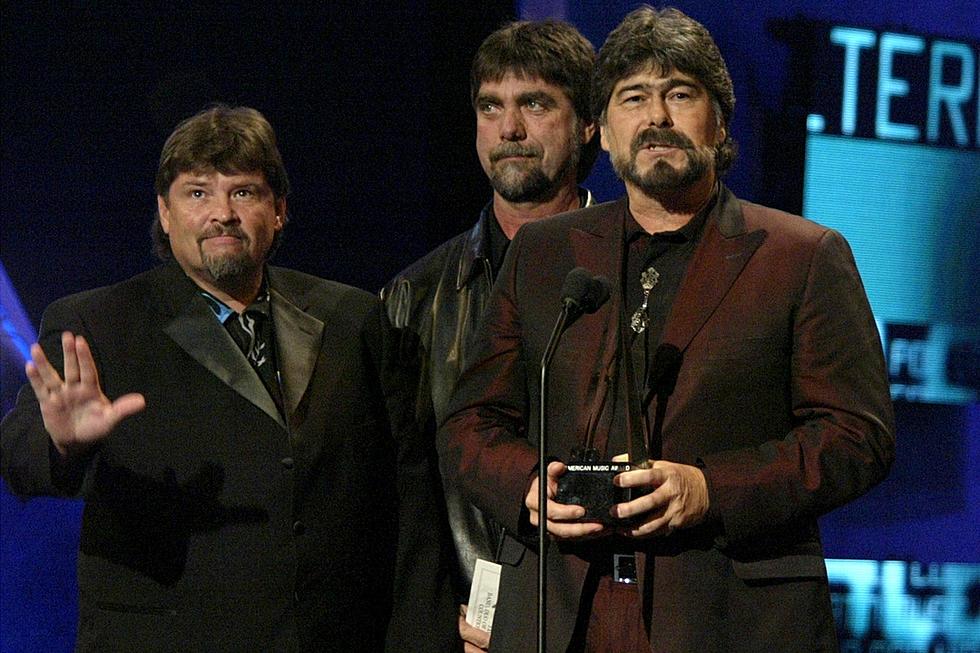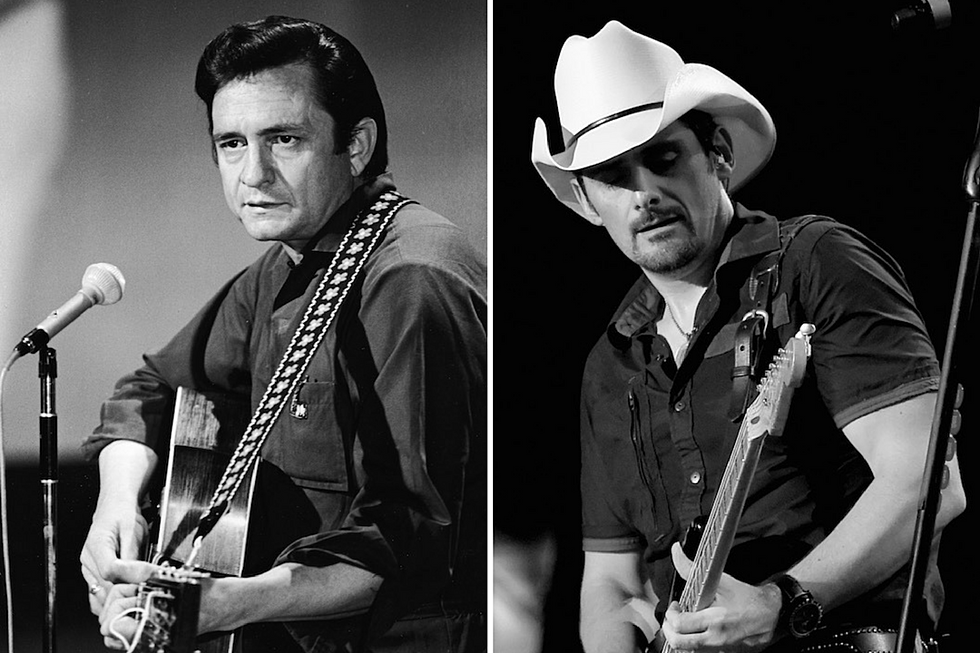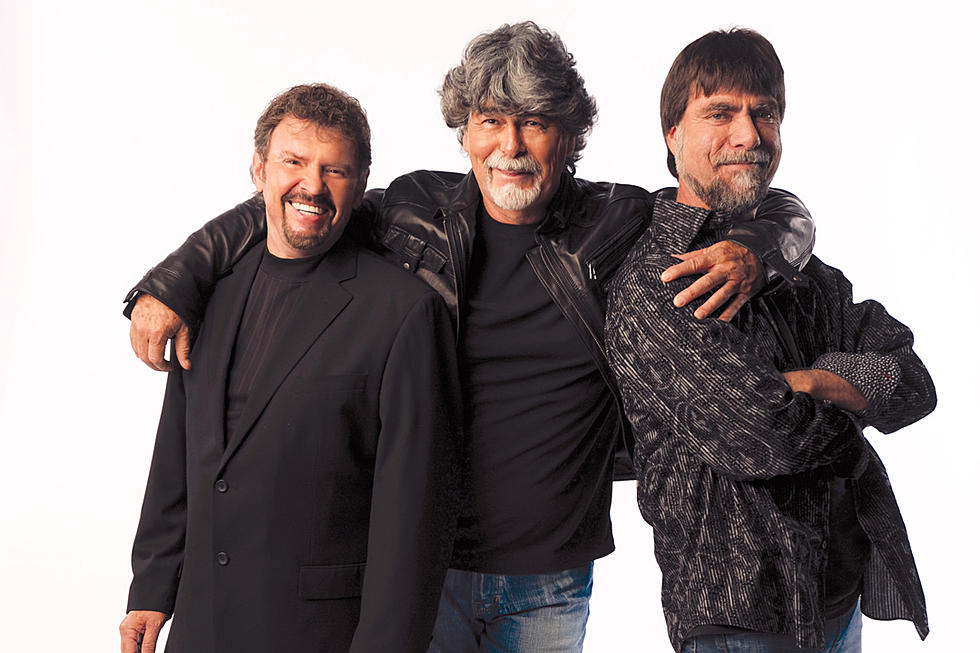
Interview: Alabama’s Teddy Gentry Talks New ‘Alabama & Friends at the Ryman’ CD + DVD
Teddy Gentry is one of the founding members of the legendary country group Alabama, who have sold more than 75 million albums and singles and placed 43 No. 1 hit songs in the country charts over the course of four decades. They have been inducted into the Country Music Hall of Fame.
The group recently got together with some of the biggest stars in country music to film a very special concert at Nashville's historic Ryman Auditorium. The result is the new CD and DVD, 'Alabama & Friends Live at the Ryman,' which features special appearances from Luke Bryan, Jason Aldean, Trisha Yearwood, Florida Georgia Line, Jamey Johnson and the Eli Young Band.
The Boot caught up with Gentry recently to talk about the new project, as well as Alabama's upcoming new studio album, in the following interview.
Where did the idea for this project come from initially?
Well, there was some talk from our management company a couple of years ago, they'd heard from some people who'd be interested in an Alabama tribute album, I guess you'd call it. We had 30 or 35 artists who had volunteered to be part of it, so we just kinda let people pick the songs that they wanted to do, and it wound up being ... Sometimes these projects don't come off as good as they look on paper, but this one did, I think. Everybody did a good job on what they did, and it was fine.
Sometimes these projects don't come off as good as they look on paper, but this one did, I think.
That was for the album; how did that lead into people actually being involved in a live performance?
We just invited everybody that was in town. We played the Ryman two nights in a row, and the second night we videoed the whole show. So we invited everybody that could, that wasn't working, that was on the project to come on by and do it live. So it was four or five artists that got to come by and do it live with us.
Did you know all of the artists involved prior to working with them, or did you meet some of them in that process?
I think we had met everybody on the project. We had met them before, so it was just fun to go into the studio and hang out with them while they were recording their tracks, and get to know the folks better. Some of them we'd just met in passing.
Was it different for you to record those with another artist? Did you change up the way you might perform the songs?
Well, we actually encouraged everybody to do their own arrangement and not try to do a carbon copy of Alabama's. Put their own twist to it, and I think everybody did.
Going into a live thing like this, having other people on stage with you and then filming it, could be a lot more pressure. Were there a lot more nerves going into that than there would be for a normal show?
I don't think so. I think Alabama's been doing it long enough, we know what we do, and we don't try to do anything that we can't do. We were there when the arrangements was done, and everybody that came out with us pretty much just did our arrangement. They just sang with us on it. So it was more pressure on them than on us, I guess. [Laughs.] But it was sure fun to get up there ... like Trisha Yearwood, I've always been such a great fan of hers, and she's one of the great voices in country music, period. To get to back her up, and Luke Bryan and Jason Aldean -- it was a fun evening.
What's the rehearsal process like for a huge evening like that? Did all of those people come down to rehearsals?
Some of them came by for a rehearsal at sound check that afternoon. A couple of them just walked out and did it live. The artists that wanted to come by were invited to.
If you're only filming the one night, what happens if there's a mistake and you don't quite capture one of the songs?
There was only one track that we messed up pretty good in the middle, so we stopped and started over again. But that was the only one. But you just laugh about it and say, 'Will y'all bear with us? We're gonna do it again.' [Laughs.]
Was it always the plan to do it at the Ryman?
Yes. I think the sound and the acoustics there are incredible. There's not a bad seat in the house as far as sound goes. It also sounds good on stage; you can hear everything up on stage. So it's a great venue for it.
There's a lot of debate going on right now about the preservation of older landmark venues and studios. The Ryman is one that was salvaged a few years back when it was going to be torn down, and now there's all this back and forth about Studio A. What's your point of view about that -- does a certain room actually have a special vibe to it that should be preserved, or can you knock them down and make way for other buildings?
I personally think that the city and state should try to preserve some of those places. But you know, it's hard to do. When the land becomes so valuable and someone wants to do something else with it, it's hard to fight progress, I guess you might say sometimes. So I don't know -- it's hard to say.
With as many huge hits as Alabama have had, you could do a different set list every night. How do you even make a set list with so many songs to choose from?
You know, you try and make it so it's a balanced show. You don't want to do all ballads, and you don't want to do all up-tempos. So you try to spread it out. And we know the songs that are requested most. We change the show every night a little bit; we'll throw in a couple of new songs that we hadn't done the night before, and take a couple out, maybe. But pretty much the gist of a show, the heart of the show, stays the same.
Alabama were apart for a few years. Was there anything to overcome in terms of getting back together, anything that you had to talk out and say, 'Let's do this differently than in the past?'
Not really. We were on good terms with each other, as far as the band members go, when we came off the road. And after the tornadoes did such devastation here, you know, we had not planned to go back out. We played a tour in '03 and the first part of '04, and basically hadn't done anything since then. But when the tornadoes came through, we talked the next day, and we said, 'Hey, we've got to do something to help these people.' So that's really what started us getting back together and rehearsing and doing a couple of shows for the tornado victims.
And then we said, 'Well, this is still fun. Let's go out and play a few shows.' So we did. You know, we're doing like 20, 25 shows a year, so it's not like going back on the road 300 days a year on tour. We're doing some isolated shows and working enough to stay tight, and still have fun doing it, so it doesn't beat you up so bad.
You've got to listen to a thousand average or below average songs before you find a couple that stand out.
Now that you're getting busier with the band, with a few different projects going and different dates going on, how do you balance that against the rest of your life? You had a few years there where you had all the time you wanted for your family or your other interests.
It's not hard now. We're only working 20, 25 shows a year. It's more like going on vacation for a couple of days and coming back home, being at home for two or three weeks and then going out and working another couple of shows. So it's no stretch now. You don't feel like you're being stretched.
There's the new gospel record and the Ryman project, and I've also heard rumors of a new Alabama studio album. Is that actually happening?
Yes. We're in the process now of picking material. We're supposed to turn it in the first of January, a new country album. We're looking for songs and continuing to write, like we always have.
Will the new material reflect a new direction for the band in light of changes at radio, or are you looking to sound like classic Alabama?
The classic Alabama sound is the reason why we've had 43 No. 1 records. We've cut a lot of different kinds of stuff. It's called a hit. We're always looking for hits. [Laughs.] There's no new direction except finding great songs and doing it the very best that we can. It's hard work. You've got to listen to a thousand average or below average songs before you find a couple that stand out. So it's just a lot of work, a long process of going through material and listening to material.
Is there anything else that you want to say about the Ryman DVD or anything else that's coming up?
I just think it's such an honor that these artists wanted to come in and be part of this project, and you don't know how may fans you have out there and how many people you influenced while they were growing up until you start a project like this. Jamey Johnson said the first song he ever learned on guitar was 'My Home's in Alabama.' So when you've got great stories, you don't have to throw this thing together. It's got some feel to it, and people that were genuinely influenced by Alabama growing up. So I think it was a great hats-off to the guys in Alabama and what we've put in over the years and the respect that the industry gives us.
More From TheBoot

![Alabama’s Pinnacle Award, Tim McGraw’s Kids Highlight CMA Fest Day 4 [Pictures]](http://townsquare.media/site/204/files/2023/06/attachment-Alabama-CMA-Fest.jpg?w=980&q=75)



![Country Artists With Stars on the Hollywood Walk of Fame [PICTURES]](http://townsquare.media/site/623/files/2015/05/shania-twain-hollywood-walk-of-fame-star.jpg?w=980&q=75)



